How to plan your GMAT Preparation with Work?
Many full-time working professionals struggle to take time out to study for the GMAT settling either for sub-par scores or taking an extended break from their work to study for the test. Some procrastinate, leaving their GMAT preparation till the very end. Yet, there are some such as Anirudh (765, Q90, V90) and Siddharth (GMAT Focus 715) who balance both their work and studying for the GMAT with ease. Read below to learn the best practices and methodology these working professionals use to create their study plans and executing the same. By the way, we have helped more than 27,000 working professionals create their study plan and ace the GMAT.
Watch this video where we highlight how can a personalized GMAT study plan help working professionals save 60+ hours of GMAT prep time:
Here’s a brief outline of our article on GMAT Study Plan for Working Professionals:
- Creating a GMAT Study Plan for Working Professionals
- Executing your GMAT study plan – taking time out to study
- Study Effectively: Divide Learning into Concentrated Learning and Little Chunks
- Find efficiencies: Where to get little chunks of time
- Key Takeaways – How to balance GMAT preparation with work
Begin your GMAT preparation with the only GMAT prep company that has delivered more 700+ scores than any other GMAT Club partner. Don’t wait to start your journey towards success. Take our free trial today and discover how we can help you achieve your GMAT goals.
1. How to Create a Personalized GMAT Study Plan for Working Professionals
A personalized study plan can save you 25% of preparation time and increase the likelihood of hitting your target GMAT score by 2 times. Using our Personalised Study Planner tool you can create your own personalized GMAT Study Plan in less than 5 minutes. Read this article to learn more about the features of the personalized study plan tool.
“A clear vision, backed by definite plans, gives you a tremendous feeling of confidence and personal power.” – Brian Tracy
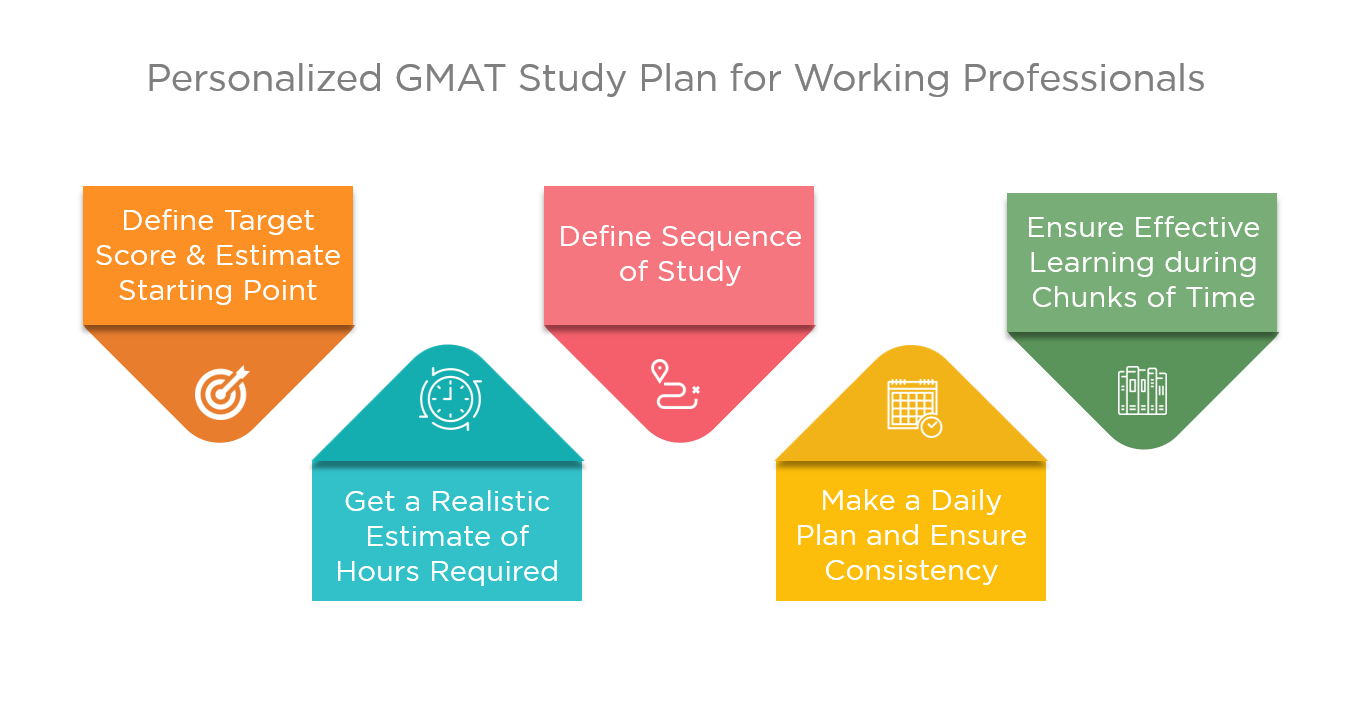
1.1 Define your Target and starting GMAT scores
Check out the MBA programs you want to apply to and the median scores of these business schools. This will give you a good sense of the kind of scores you would need. Aim for the median score, if you have an excellent profile, don’t need scholarships, and are taking the GMAT to ensure your chances of an admit. On the other hand, aim for a GMAT score 20-30 points above the median score if you need scholarships or a full fellowship and need the GMAT to further your candidacy.
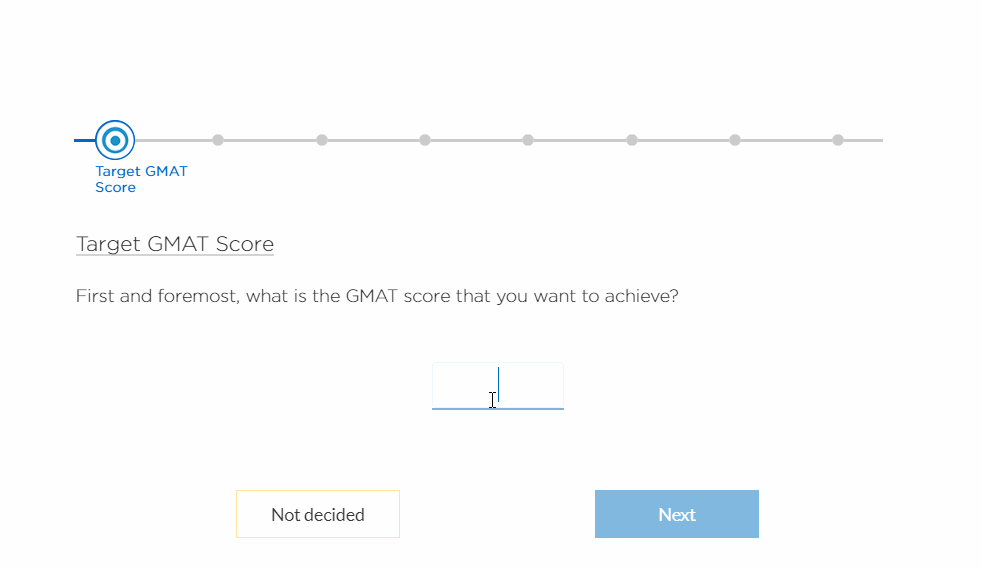
If you are planning to take the GMAT, we can help you with a personalized study plan and give you access to quality online content to prepare. Write to us at acethegmat@e-gmat.com. We are the most reviewed GMAT prep company on gmatclub with more than 2700+ reviews .
Why don’t you take a free trial and judge for yourself?
Using the Personalized Study Planner Tool
The Personalised Study Planner Tool recommends setting your target GMAT score as 655+. This score corresponds to a 90%ile score and is around the median GMAT score for most business schools and their MBA programs. The tool assumes your starting GMAT score as 565 which corresponds to 50%ile, as this is the median GMAT score of all test takers.
In suggesting the starting score the system assumes that you have similar abilities in both the Quant and Verbal sections of the GMAT. In case you have more granular information about your sectional (i.e. Quant and Verbal) abilities you can modify the combination of Quant and Verbal scores needed to hit your target GMAT score.
You can always change the target and starting GMAT scores to modify and get a more precise study plan using the tool. Based on your inputs the system will show you the week in which you can plan to take the GMAT. The following assumptions underlie the suggested date:
- You start your GMAT Preparation from the next day of creating this plan
- You will set aside/devote a minimum of 20 hours per week towards the preparation
- You will use a data-driven online course that will help you track your preparation and course correct.
Best Practice: Write this score down next to the study area in your house.
Learn more about what is a good score for MBA scholarships? and how to make your MBA pocket friendly? in these articles.
1.2 Determine the Milestones to reach your target GMAT score
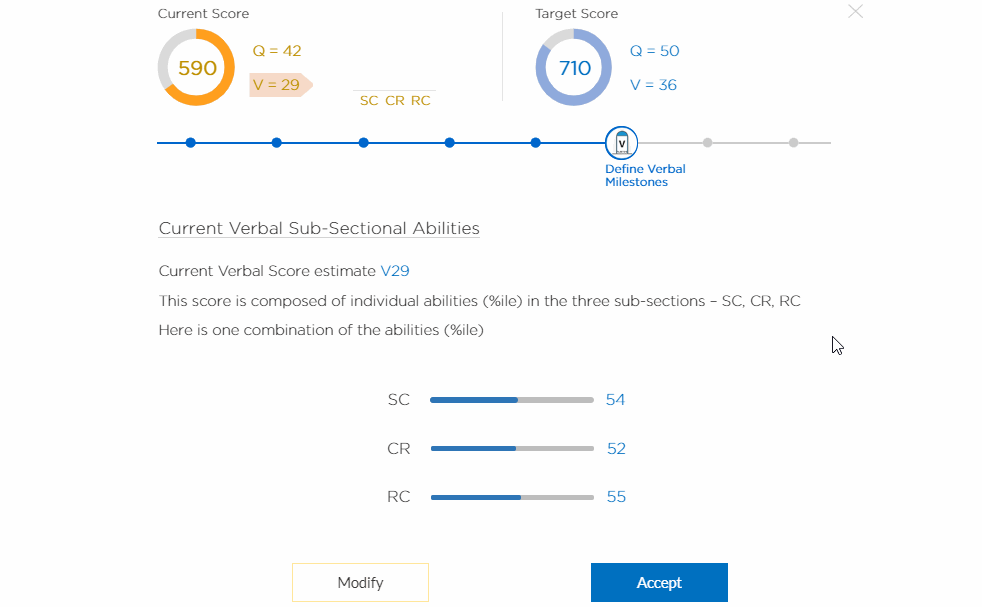
Write to us at acethegmat@e-gmat.com if you need help in crafting your study plan. Our team of GMAT Strategy Consultants would love to help you!
In this stage, the tool uses more precise information to define your path to the target score.
Your Verbal score is composed of SC, CR, and RC sub-sectional scores, and Quant is composed of Arithmetic and Algebra scores. The system gives you these sub-sectional score combinations for your current Verbal, and Quant scores entered earlier. If you know the exact abilities or want to change the estimates as per your comfort level, you can do so by clicking on the ‘Modify’ button.
Now, based on the strong and weak areas defined in the above step, the system gives you the targets/ milestones that you need to reach in each sub-section for achieving your overall target score. You can again update the combination by clicking on ‘Modify.’
Note: You can use the lock function to change more than 1 sub-sectional score. You will be allowed to change only 2 sub-sectional scores at the most. The system will calculate the third score by itself based on your total Verbal score.
The system will also calculate and display the approximate time required to hit your target verbal sub-sectional scores.
1.3 Get the Final Study Plan
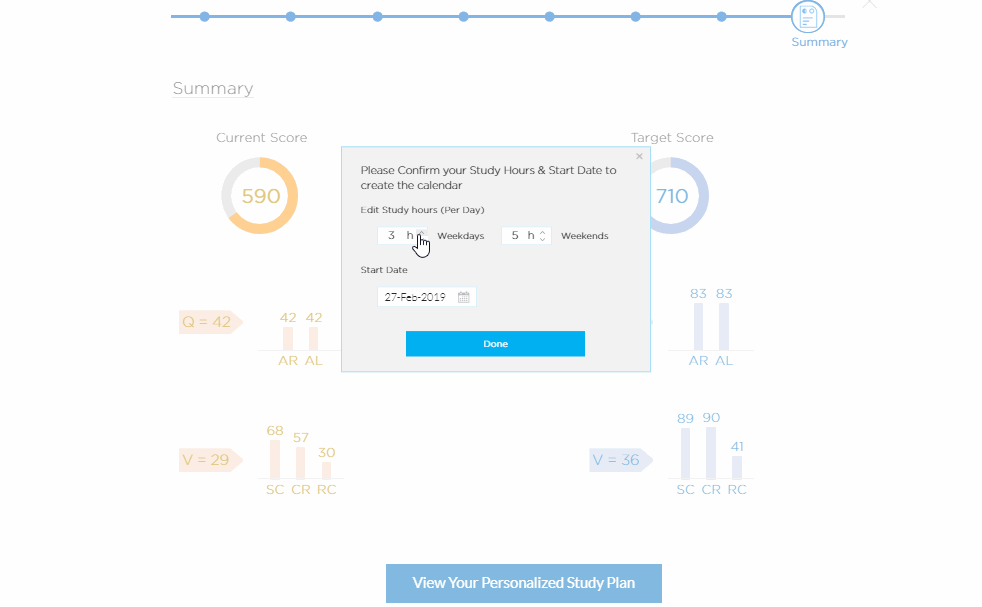
In this stage, you get the final study plan in calendar form. Our recommendation is to start with the section that you are stronger in; this is the default setting in the calendar view that is displayed. This helps you in building much-needed momentum and confidence in your GMAT Preparation.
You can also change the amount of time you will spend on weekdays and weekends doing GMAT preparation, based on your schedule. Not just that, if you have prior commitments on any day or you are taking a holiday from work during the preparation period, you can change the number of hours you would be studying on a particular day by clicking on that day.
In this view, you also get to see the more precise estimate of the GMAT date mentioned earlier. This date considers 7 days for taking 2 mocks and working on the test-taking strategy and revision.
Creating a Working Professional GMAT Study Plan using the Personalized Study Planner Tool – A Summary
Now that you have gone through the steps to create the Personalized Study Plan, let’s quickly look at the best practices and summarize things you need to keep in mind while creating the plan.
- Even without having precise information the tool allows you to create a personalized study plan, to begin with.
- To make the plan more customized learn about your current and target scores.
- Aim for 30 points higher than the median score of your target programs.
- Take a mock test to know your starting Q and V scores. This will help you chose a path that leverages your strength.
- Make sure your mocks also give you information about the sub-sectional scores (SC, CR, RC, Alg, Ar). This will again help you leverage your strength and reduce the prep time.
- Take note of the MILESTONES (target abilities or percentiles) that you finalize in the plan. A milestone-driven study plan makes you twice as likely to achieve your target score.
- Lastly, whether you have a GMAT date in mind or not you should take note of the amount of effort or study hours required to ace the test. Be diligent enough to put in that time.
2. How to manage work with GMAT Preparation?
Now that you have created a personalized GMAT study plan, let us look at a few tips that will help you stick to the plan and hit your target GMAT score.
2.1 Determine when you will study
Most working professionals who work 40+ hours per week can take out up to two hours per day on weekdays (working days) and up to 4 hours per day on weekends, amounting to 18-20 hours per week. A good number of people write to me thinking that they can put in 4 hours per day while working full time. Such thinking can only be termed wishful for two reasons:
- After accounting for work, commute, and sleep, it’s very difficult to take more than 2 hours out on a regular basis.
- Even if you can take time out, your brain still needs to be willing to learn. Expecting to actively study for 4 hours per day after a long day at work can be too taxing on the brain.
While there can be exceptions to the above, especially for people like Mayank (730, V40) who worked from home. Yet, such cases are more of an exception.
Here’s Mayank’s Story on how he created a well-defined study plan to achieve a GMAT 730 in the first attempt!
2.2 Make a Daily Plan and stick to it – Cover up on the Weekends if there is a lag
At e-GMAT, we strive to make the students’ life easier at every level and therefore, we have built this fantastic tool called the GMAT Personalized Study Planner. With this tool, you can not only find out the Quant and Verbal Sectional scores but also Sub-sectional scores in Quant (Algebra, Arithmetic, etc.) and Verbal (CR, RC, and SC) to achieve your target GMAT Score! Moreover, this tool will craft your very own study plan in 5 minutes. Register for our FREE Trial and create your personalized study plan in 5 mins!
“Unless commitment is made, there are only promises and hopes; but no plans.” – Peter Drucker
While most working professionals can take out 18 hours per week working full time, a good number of them struggle to put in even 12 hours of substantial study time. Why?? Because they cannot decide when to study on weekdays.
When you don’t plan to study, then the decision whether to study becomes a struggle in itself, procrastination sets in, and pretty much time passes by. Hence, the first thing a working professional should do after creating your study plan is to decide when to study, i.e., whether to:
- Wake up early and put in a couple of hours.
- End work early and put in a couple of hours before sleeping.
- Put in an hour in the morning and one in the evening.
Which option you choose depends on what works for you. There is no right or wrong choice here – as long as you make a choice. The only wrong decision is not making one.
When you don’t plan to study, then the decision whether to study becomes a struggle in itself, procrastination sets in, and before you realize time just passes by.
Shrutav (805, Q90, D90, V90) decided to study early morning during weekdays. During weekends he dedicated 3-4 hours or more, if possible.
Similarly, Mansi was very disciplined when it came to preparation. She worked more than 50 hours a week and so she made sure she makes the most of her weekends. She scored a 770 on the GMAT and got admits from Harvard, Wharton, Stanford, INSEAD, and Kellogg.
2.3 Take help from Family/Friends/Colleagues

Preparing for GMAT along with a full-time job will require you to go “all in” in terms of time commitment, and you would find it difficult to do without enlisting the support of your family, friends, and colleagues.
It is very likely that you will spend less time with your family and friends and that you may need to request your colleague to help you out every once in a while. Make sure you prepare them and get their buy-in. Make them believe in your dreams. Many working professionals who ace the GMAT credit their families (wives, boyfriends, girlfriends, parents, etc.) and colleagues for their success.
“the biggest contributor to my success was the support from my wife. My study time took out 90% of our together time. So to make the most of the remaining 10%, we developed a routine to play ping pong for a few minutes every night. There is more below but I would tell you that support from family and friends is probably the most important contributor to one’s success.” – Sanket Sharma – Working Professional – GMAT 760
Not just Sanket, Anupriya was able to reach her desired score of 760 because of the constant support and encouragement from her family.
2.4 Create TIME by making changes to your daily chores
A lot of people, all around the world, spend a good one to two hours traveling to and from work daily. If you are one of those people, you may want to talk to your boss and ask for permission to work from home a couple of times a week at least and study both before and after work on these days. On the other days, you must make use of this travel time to review your notes and prep materials instead of other activities that are not adding any value to your prep. If possible, take a cab while commuting so that you can study peacefully.
If you stay by yourself, then planning your food can take up as much as 5 hours per week. While there is no alternative to eating healthy, you must look for ways to free up this time. If a member of your family can support you or you can subscribe to some food delivery service that can keep delivering daily without your intervention, do that. Basically find a way that works best for you to free up the time spent on planning, buying, cooking food.
2.5 Ensure Consistency

Take a free GMAT mock to understand your baseline score and start your GMAT prep with our free trial. We are the most reviewed online GMAT Prep company with 2900+ reviews on GMATClub
Make sure you study consistently. On the days that work gets hectic and you are not able to keep up with your study plan, make sure that you solve at least a few questions from the topics that you’ve already prepared. This will ensure that you do not lose touch and flow of your studies. You may think it is just one day, so what if I couldn’t keep up with GMAT prep, I had a lot to do at work. This one day will soon become one week and then one month. But if you make sure that you go back to prep every day no matter what then that it won’t be even one day let alone one week or one month.
3. Divide Learning into Concentrated Learning and Little Chunks
3.1 Have an hour or more of learning window – Learn new things

Learning a new topic requires concentrated effort, so make sure that you have at least an hour for it. It is advisable that you go through the entire topic in one sitting to ensure effective learning. Most online courses have multiple small video lessons on the same topic. Watching the whole set for one topic in one sitting will ensure that the learning is cemented. To give you an example of this – in the Verbs module in our SC course the first four files can be completed in an hour with the last file being the application of the concepts on questions. When you approach each topic in a structured manner (topic + questions + feedback) you are bound to learn more effectively.
Similarly, when learning using books, a chapter typically requires about 1.5 hours (15 pages). This allows most people to go through most of the chapter in the sitting.
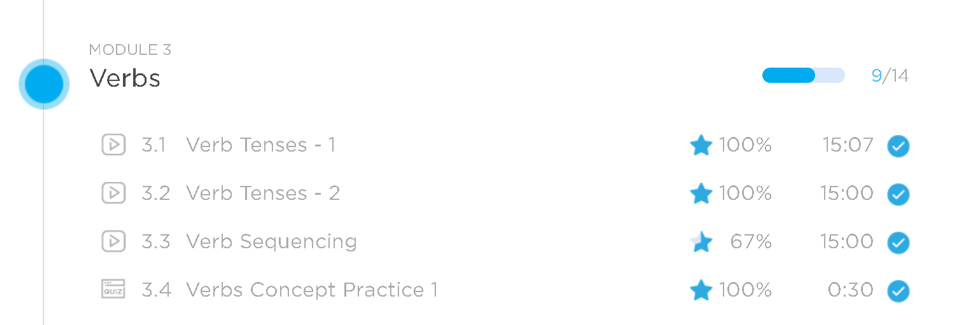
Take a free GMAT mock to understand your baseline score and start your GMAT prep with our free trial. We are the most reviewed online GMAT Prep company with 2900+ reviews on GMATClub
Attend our weekend webinars
3.2 Have 15 – 45 minutes of free time – focus on continued learning and revision
a. Continued learning
If you have started a module carry on with the same module as each file in a module would require 15-20 minutes only ensuring that you can logically take the module to closure. Do not start a new module though. As mentioned in the previous section, learning a new topic will require concentrated effort and time, and you must ensure that you give it that. If you’ve just completed a module, revisit the sections that you have bookmarked to make notes of important points or points that you are likely to make mistakes in. You may even take short quizzes on the module you have just completed.
b. Revise – strengthen your foundation
It is possible that you do not comprehend the entire concept in one go for certain complex topics. You must revise the lessons which you found complex. You can bookmark the file or change the status for revisiting it. For those of you using the e-GMAT course, you must also revise the files where your score is lower than 80%. Sharing below an example of the feedback that you will get.
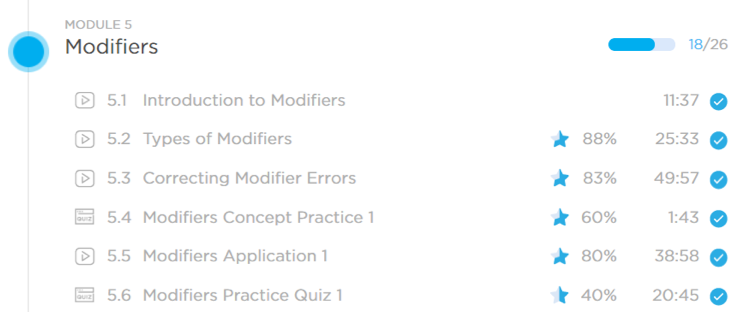
If you have solved a few quizzes, then you must revisit the mistakes that you have made in those questions and learn from them. It is essential that you make the most of every question that you solve since you would not have time to solve a lot of questions.
“As working people, our time is precious. It’s probably not about the quantity of hours but you know the quality of hours. If you’re spending two hours, how much time of that are you actually focused? How much of that are you distracted? – Shrutav (805 – Q90 V90 D90)
4. GMAT Preparation and Working Professionals – How to find time to prepare for the GMAT?
You can find these little chunks of time while traveling, during lunch breaks, between meetings, waiting for your commute, or at any other time when you get 15-20 minutes at a stretch.
Important things to ensure effective learning during chunks
- Find a course that allows you to study in chunks and from anywhere, i.e., a course that is flexible and mobile
- Use headphones so that you can watch the lessons on the go without disturbing others or getting disturbed by external noise
- Find a corner to study when in the office so that you aren’t disturbed constantly. If it is a place where others can’t see you would be even better as that will lead to much fewer questions.
5. Key Takeaways – GMAT Study Plan for Working Professionals
While studying for the GMAT while working full time is challenging, it is certainly doable. More than ninety percent of the people who score 685 or higher work full time. By planning your preparation, creating a study strategy, and making a few adjustments to your day, it can become very manageable as long as you
- Make a proper study plan
- Have realistic expectations of how much time you can put in
- Make time – if you need more time
- Be consistent.
Write to us at acethegmat@e-gmat.com if you need help in crafting your study plan. I and our team of GMAT Strategy Consultants would be happy to help!














